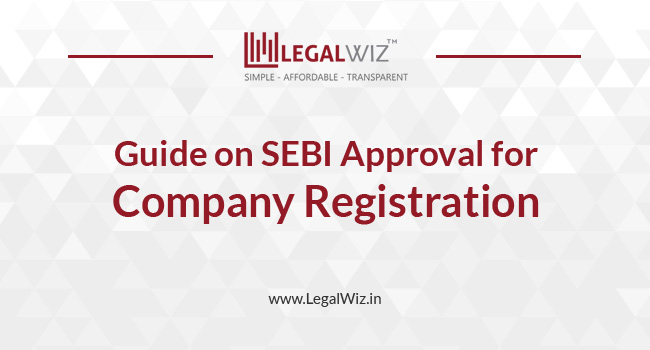How to obtain SEBI Approval for Company Registration?
India hosts a wide range of businesses across various sectors, each with its own set of compliance requirements. Depending on the nature of activities, certain businesses fall under the jurisdiction of specific regulatory bodies.
For instance, companies operating in the financial securities market are regulated by the Securities and Exchange Board of India (SEBI), while Non-Banking Financial Companies (NBFCs) are overseen by the Reserve Bank of India (RBI).
This article highlights the types of companies that require SEBI approval and outlines the step-by-step process to obtain SEBI registration.
What is a SEBI Certificate?
The Securities and Exchange Board of India (SEBI) serves as the primary regulatory authority overseeing the country’s securities market. Any individual or entity seeking to operate in financial securities must secure SEBI registration before initiating business activities.
Once granted, this certification acts as formal authorization, confirming that the enterprise complies with SEBI’s regulations. Only then can businesses proceed with company registration in India while maintaining regulatory adherence.
SEBI’s Role in Market Regulation
The Securities and Exchange Board of India (SEBI) plays a crucial role in maintaining fairness and trust in India’s capital markets. Its main responsibilities include:
Ensuring Transparency
SEBI enforces fair trading practices and requires timely financial disclosures to prevent insider trading and market manipulation.
Protecting Investors
It implements safeguards to protect retail investors from fraud and unethical practices.
Regulating Market Participants
SEBI monitors and regulates entities like stockbrokers, mutual funds, portfolio managers, and investment advisors.
Enforcement of Securities Laws
SEBI has the authority to investigate misconduct, impose penalties, and take corrective actions when needed.
Does Your Company Need SEBI Approval?
If your proposed company name or business model falls within SEBI-regulated financial services, obtaining SEBI approval isn’t just beneficial—it’s mandatory.
Several financial entities must obtain SEBI approval, including:
- Stock Brokers & Sub-Brokers
- Investment Advisors.
- Merchant Bankers
- Registrar and Transfer Agents (RTA)
- Mutual Funds & Asset Management Companies
- Venture Capital Firms & Portfolio Management Businesses
- Foreign Portfolio Investors (FPIs)
Since compliance requirements differ across business types, companies must review SEBI guidelines before initiating registration to ensure smooth approval.
Key Documentation for SEBI Regulatory Approval
The documents needed for SEBI registration include:
- PAN and Aadhaar of promoters/directors
- Certificate of Incorporation
- Financial Statements
- Net worth certificate (for specific entities)
- Business Plan
- Details of key personnel
Having accurate documentation ensures seamless approval under the Online procedure to register with SEBI.
How to Get SEBI Approval?
Follow this step-by-step process to obtain SEBI registration before company incorporation.
Step 1: Understand Compliance Requirements
Before initiating the registration process, thoroughly review SEBI guidelines relevant to your business activity. Compliance standards vary based on business type, so clarity beforehand ensures a smoother approval process.
If you’re still in the process of securing your company name before obtaining SEBI approval, check out this guide on reserving a company name to ensure a smooth registration journey.
Step 2: Register as a SEBI User
SEBI offers a digital platform for seamless registration. Applicants must first register as an intermediary on SEBI’s online portal to proceed.
Step 3: Submit Application for SEBI Approval
Once registered, submit your business details, including the following:
- Business Name
- Nature of Business Activities
- Organizational Structure
- Business Plan
- Capital Structure
- Place of Incorporation
- Covering Letter (specifying new registration or prior application status)
After submission, SEBI reviews the application within 25 to 30 working days.
Step 4: On-Site Inspection (If Required)
For certain businesses, SEBI may conduct due diligence checks, especially for Mutual Funds and Credit Rating Agencies (CRAs), to assess compliance and investor protection mechanisms.
Step 5: Grant of SEBI Certificate
Upon successful review, SEBI informs the applicant about approval. The final payment draft must be submitted to SEBI, payable at Mumbai. Once processed, SEBI issues the registration certificate, officially recognizing the entity as a SEBI-registered company.
Key Obstacles in SEBI Registration Process
Encountering challenges in SEBI registration can lead to delays and complications, making it essential to address potential obstacles early.
1. Documentation Issues
Errors or missing details in paperwork can lead to delays in approval.
2. Compliance Difficulties
Businesses often face challenges in meeting SEBI’s regulatory requirements after registration.
3. Application Rejections
Failure to meet net worth criteria or other eligibility standards can result in rejection.
Regulatory Compliance After SEBI Registration: What Businesses Must Follow
Once an entity secures SEBI registration, it must adhere to several regulatory obligations:
1. Regular Financial Filings
Companies must submit quarterly and annual financial reports to SEBI, ensuring transparency and regulatory compliance in financial disclosures.
2. Net Worth Maintenance
Businesses must maintain the required net worth threshold, as failing to do so may result in penalties or restrictions on operations.
3. Investor Complaint Handling
Addressing investor grievances promptly is essential to maintaining trust and adhering to SEBI’s investor protection guidelines.
4. Transaction Disclosures
Companies are required to report all investment transactions to SEBI, ensuring accountability and preventing financial irregularities.
5. KYC and AML Regulations
Businesses must follow Know Your Customer (KYC) and Anti-Money Laundering (AML) guidelines to prevent financial fraud and ensure compliance.
6. Audits and Inspections
Companies undergo regular audits and occasional surprise inspections by SEBI to verify regulatory adherence and financial transparency.
What Happens If You Violate SEBI Regulations?
Failure to comply with SEBI registration norms can lead to serious consequences, including:
- Monetary Penalties – Fines ranging from ₹1 lakh to ₹1 crore.
- License Suspension or Cancellation – Businesses may lose their SEBI registration.
- Operational Restrictions – Limitations on future business activities.
Conclusion
Navigating SEBI registration can be complex, with strict documentation requirements, compliance checks, and regulatory approvals. Ensuring your business meets SEBI’s standards is crucial to avoiding delays or penalties. LegalWiz.in streamlines the entire registration process, providing expert guidance, accurate documentation assistance, and compliance support. Whether you need help verifying company name availability, preparing SEBI approval applications, or maintaining post-registration obligations, LegalWiz.in ensures a hassle-free experience. With a dedicated team and a user-friendly platform, businesses can secure SEBI registration effortlessly while staying fully compliant with regulatory norms.
Frequently Asked Questions
Can I become a stock broker without obtaining SEBI approval?
Yes, if your startup deals with securities, investments, portfolio management, or related activities, SEBI registration is required before starting operations.
Can I apply for SEBI approval before registering my company?
Yes, SEBI approval should be obtained before company incorporation if your business name includes terms like “Mutual Fund” or “Stock Exchange.”
Does SEBI registration improve business credibility?
Absolutely! Being a SEBI-registered company assures investors, clients, and stakeholders that your business is legally compliant and adheres to financial regulations.
What is the biggest challenge in obtaining SEBI approval?
Many founders struggle with unclear compliance requirements. Understanding specific SEBI guidelines for your business category before applying can help avoid rejections or delays.
Do solo entrepreneurs or independent financial consultants need SEBI registration?
Yes, if you’re offering investment advice, portfolio management, or securities services, SEBI registration is required—even if you’re operating as an individual consultant.
What happens if I start operations without SEBI approval?
Operating without SEBI registration can lead to penalties, legal action, and even restrictions on conducting business. SEBI has strict monitoring policies for financial entities.
Is SEBI approval a one-time process, or does it need renewal?
Certain categories, like mutual funds and merchant bankers, require renewal periodically. It’s important to stay updated on SEBI’s latest regulations for ongoing compliance.
Can SEBI reject my application? What do I do then?
Yes, SEBI can reject applications due to incomplete documentation or non-compliance. In such cases, you must rectify errors and reapply with accurate details.
How can I make the SEBI approval process faster?
To streamline approval, ensure all required documents are prepared, comply with SEBI guidelines specific to your business, and avoid inconsistencies in your application.

CS Prachi Prajapati
Company Secretary with a forte in content writing! Started as a trainee, she is now leading as a Content Writer and a Product Developer on technical hand of LegalWiz.in. The author finds her prospect to carve out a valuable position in Legal and Secretarial field.








This is very attention-grabbing, You’re an excessively professional blogger.
I’ve joined your feed and sit up for searching for more of your great post.
Additionally, I have shared your web site in my social networks
Thanks
For describe wonderful blog.
Great point,Very informative…
I actually added your blog to my favourite and will look forward for more updates. Great Job, Keep it up. First of all let me tell you, you have got a great blog .I am interested in looking for more of such topics and would like to have further information. Hope to see the next blog soon.
Happy to read this very useful information. Nice and detailed explanation.
Appreciate your sharing and tweeted :)
Thanks
For describe wonderful blog.
Great point,Very informative…